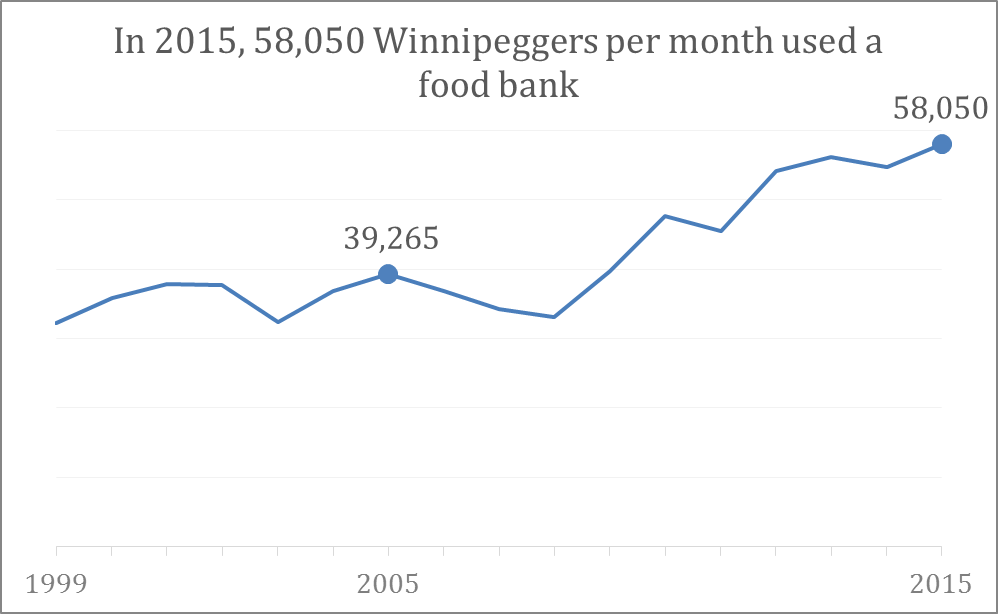More Winnipeggers are using food banks
February 20th is the World Day of Social Justice – recognizing the need for food, shelter, and other basic needs. What does Peg tell us about hunger in our own city by looking at food bank use in Winnipeg?
February 20th is the World Day of Social Justice – recognizing the need for food, shelter, and other basic needs. What does Peg tell us about hunger in our own city by looking at food bank use in Winnipeg?
Peg tells us…
In 2015, there were 58,050 Winnipeggers receiving food from Winnipeg Harvest’s food bank and meal/snack programs each month – the highest number of participants to date.
The facts are:
• While there have been fluctuations year to year, the number of Winnipeggers using a food bank each month has been steadily rising since 1999.
• In the last ten years, the number of users increased by almost 20,000 – from 39,265 in 2005 to 58,050 in 2015.

Why does this matter?
• Most food banks have a mission to share food with hungry families while undertaking other activities (such as training and learning opportunities) that moves communities towards a future where hunger is minimized and the services of a food bank are no longer required.
• The use of food banks can reflect both the efficacy of the food bank system in reaching a large number of people in need, and the number or proportion of people within a community with the need for food, usually due to poverty.
• Food bank use can also serve as a proxy for the economy as well as the effectiveness of social policies, as food banks are often the first signs of economic trouble and/or income inequality (Food Banks Canada, 2010).
More facts on this subject available at:
Peg data:
Source of the data: Peg’s data for the Food Bank Use indicator is provided by Winnipeg Harvest.
Media inquiries:
We’d love to connect you with someone who can tell you more about Peg, the data, or who is making a difference in the community. Please contact:
Sumeep Bath, Media and Communications Officer
International Institute for Sustainable Development (IISD)
About us:
Peg (mypeg.ca) is a community indicator system that measures the health of our community year over year – in ways that count. Peg is led by two partnering organizations – the International Institute of Sustainable Development (IISD) and United Way of Winnipeg (UW).
Regularly, the team at Peg releases data and facts that help us understand our city better. This is one of those regular reports. Others can be found at
.Peg is the starting place for Winnipeg citizens, educators, policy makers, and many others to learn more about our city so we can lead change to create a better city for our children and their children. At Peg we can all learn how our lives, our neighbourhood and our city is changing – for the good and the bad. Learn more at www.mypeg.ca.
About IISD
The International Institute for Sustainable Development (IISD) is an award-winning independent think tank working to accelerate solutions for a stable climate, sustainable resource management, and fair economies. Our work inspires better decisions and sparks meaningful action to help people and the planet thrive. We shine a light on what can be achieved when governments, businesses, non-profits, and communities come together. IISD’s staff of more than 250 experts come from across the globe and from many disciplines. With offices in Winnipeg, Geneva, Ottawa, and Toronto, our work affects lives in nearly 100 countries.
You might also be interested in
Human Capital in Ethiopia, Indonesia, and Trinidad and Tobago
Human capital is the major component of comprehensive wealth in most countries, and how it is managed is key to long-term prosperity.
Financial Capital in Ethiopia, Indonesia, and Trinidad and Tobago
Like other assets of the comprehensive wealth portfolio, financial capital can be used to support a country's long-term prosperity.
Natural Capital in Ethiopia, Indonesia, and Trinidad and Tobago
Natural resources play fundamental roles in our well-being and lives, as well as sustaining a country's comprehensive wealth.
Produced Capital in Ethiopia, Indonesia, and Trinidad and Tobago
Part of comprehensive wealth, produced capital is the value of the stock of all human-made assets used to produce goods and services in the economy.